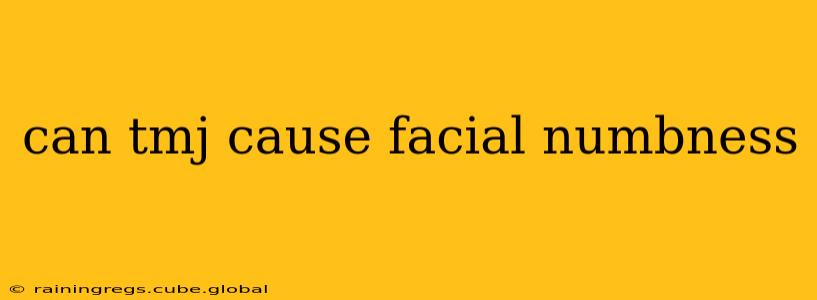Temporomandibular joint disorder (TMJ) is a common condition affecting the jaw joint and the muscles controlling chewing. While jaw pain and clicking are well-known symptoms, many sufferers also experience less understood symptoms, including facial numbness. This article explores the potential link between TMJ and facial numbness, clarifying the connection and addressing common questions.
What is TMJ?
TMJ refers to problems with the temporomandibular joint, the hinge connecting your jaw to your skull. These problems can arise from various causes, including injury, inflammation, arthritis, and even stress. The resulting symptoms can range from mild discomfort to debilitating pain, affecting daily life significantly.
How Can TMJ Cause Facial Numbness?
Facial numbness in TMJ isn't a direct, immediate effect of the joint itself. Instead, the connection is often indirect and involves the complex network of nerves and blood vessels in the face and head. Here's how it might happen:
-
Nerve Compression: The temporomandibular joint is closely associated with several cranial nerves. If the joint is misaligned or inflamed, it can put pressure on these nerves, leading to numbness, tingling, or altered sensation in the face. This is particularly true for the trigeminal nerve, which is responsible for sensation in much of the face.
-
Inflammation: Chronic inflammation associated with TMJ can extend beyond the joint itself, affecting surrounding tissues and potentially irritating or compressing nerves.
-
Muscle Spasms: Tight or spasming jaw muscles can constrict blood vessels and potentially restrict blood flow to parts of the face, potentially contributing to numbness or tingling sensations. However, this is less common than nerve compression as a primary cause.
-
Referred Pain: Pain originating from the TMJ can sometimes be "referred" to other areas of the face, causing sensations like numbness or tingling. The brain can misinterpret the signals, leading to a feeling of numbness in an area not directly affected by the joint issue.
Can TMJ Numbness Affect Specific Areas of the Face?
Yes, the area of facial numbness associated with TMJ can vary depending on which nerve is affected. Numbness might be experienced in the:
- Cheek: This is a common location for TMJ-related numbness.
- Chin: Numbness in the chin is also frequently reported.
- Lip: Upper or lower lip numbness can occur.
- Temple: Tingling or numbness around the temple area is possible.
It's crucial to note that the numbness associated with TMJ is usually not a complete loss of sensation but rather a change in sensation, often described as tingling, pins and needles, or a general dullness.
How is TMJ-Related Facial Numbness Diagnosed?
Diagnosing TMJ-related facial numbness requires a thorough examination by a healthcare professional, typically a dentist specializing in TMJ disorders or an oral and maxillofacial surgeon. They'll consider your medical history, examine your jaw joint, and may order imaging tests (like X-rays or MRI scans) to rule out other conditions. Nerve conduction studies might also be used to assess nerve function.
What are the Treatment Options for TMJ-Related Facial Numbness?
Treatment for TMJ-related facial numbness focuses on managing the underlying TMJ disorder. Options may include:
- Pain relievers: Over-the-counter medications like ibuprofen or naproxen can help manage pain and inflammation.
- Muscle relaxants: These can help alleviate muscle spasms contributing to the issue.
- Splints or mouthguards: These devices can help realign the jaw and reduce strain on the joint.
- Physical therapy: Exercises and stretches can help improve jaw mobility and reduce muscle tension.
- Injections: Corticosteroid injections can reduce inflammation in the joint.
- Surgery: In severe cases, surgery may be considered as a last resort.
It's essential to seek professional medical advice for any persistent or concerning facial numbness.
Does TMJ Always Cause Facial Numbness?
No, TMJ does not always cause facial numbness. Many individuals with TMJ experience pain, clicking, and jaw stiffness without any sensory changes. Facial numbness is a less common but still potentially significant symptom.
Can Other Conditions Cause Similar Symptoms?
Yes, several other conditions can cause facial numbness, including:
- Trigeminal neuralgia: A condition causing intense facial pain.
- Bell's palsy: A temporary facial paralysis.
- Multiple sclerosis: A neurological disorder.
- Stroke: A serious medical emergency.
It's vital to receive a proper diagnosis to determine the underlying cause of facial numbness and receive appropriate treatment. Do not attempt self-diagnosis; always consult a healthcare professional.
Disclaimer: This information is for educational purposes only and does not constitute medical advice. Always consult with a qualified healthcare professional for diagnosis and treatment of any medical condition.
